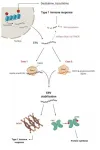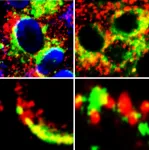INFORMATION:
Study participants included Philip Freund and Dr. Letizia Marvaldi of the Biomolecular Sciences Department; Dr. Tali Shalit of the Nancy and Stephen Grand Israel National Center for Personalized Medicine; Dr. Alexander Brandis and Tevie Mehlman of the Life Sciences Core Facilities Department; and Dr. Michael Tsoory of the Veterinary Resources Department.
Prof. Michael Fainzilber is the incumbent of the Chaya Professorial Chair in Molecular Neuroscience
Prof. Fainzilber's research is supported by the Moross Integrated Cancer Center; the David Barton Center for Research on the Chemistry of Life; the Laraine and Alan A. Fischer Laboratory for Biological Mass Spectrometry; the Dr. Miriam and Sheldon G. Adelson Medical Research Foundation; Miel de Botton; and the Estate of Lola Asseof for Alzheimer's Disease Research.
A natural food supplement may relieve anxiety
Mice receiving the plant-derived substance were less anxious than the controls
2021-05-24
(Press-News.org) A natural food supplement reduces anxiety in mice, according to a new Weizmann Institute of Science study. The plant-derived substance, beta-sitosterol, was found to produce this effect both on its own and in synergic combination with an antidepressant known under the brand name Prozac. If these findings, published today in Cell Reports Medicine, are confirmed in clinical trials, they could point the way toward the use of beta-sitosterol as a treatment for relieving anxiety in humans.
Anxiety is not always a bad thing. In fact, in evolutionary terms, feeling anxious about potential threats is critical for survival because it helps us mount an appropriate response. That's precisely why developing antianxiety drugs is so challenging. The circuits for anxiety in the brain are closely related to those responsible for memory, awareness and other functions vital for handling danger, so scientists are on the lookout for compounds that can selectively suppress anxiety without causing unwanted side effects.
The starting point for the present study was research conducted several years ago in the lab of Prof. Mike Fainzilber in Weizmann's Biomolecular Sciences Department. Dr. Nicolas Panayotis and other lab members studied the roles of proteins that shuttle cargoes into the nuclei of nerve cells, and they discovered that in stressful situations, mice lacking a shuttling protein known as importin alpha-five showed less anxiety than the control mice. The researchers then checked how these "calmer" mice differed from regular ones in terms of gene expression, and they identified a genetic signature of their "calmness": about 120 genes with a characteristic pattern of expression in the hippocampus, one of the brain regions that regulate anxiety.
In the new study, Panayotis, now a senior intern in Fainzilber's lab, together with colleagues, searched an international genomic database for existing drugs or other compounds that might mimic the same gene expression signature. He identified five candidates and tested their effects on behavior in mice. That was how the researchers zeroed in on beta-sitosterol, a plant substance sold as a dietary supplement intended mainly to reduce cholesterol levels.
In a series of behavioral experiments, mice given beta-sitosterol showed much less anxiety than the controls. They were, for example, less fearful than the controls when placed in an illuminated enclosure, daring to walk into its brightly lit center, whereas regular mice were careful to stay on the darker periphery, avoiding the stress of the bright light. Moreover, the mice receiving beta-sitosterol did not exhibit any of the side effects that might be expected from antianxiety medications - their locomotion was not impaired, and they did not refrain from exploring novel stimuli.
Next, the researchers tested the effects of beta-sitosterol on mice when given in combination with fluoxetine, a drug belonging to the class of selective serotonin reuptake inhibitors, or SSRIs, and sold under the brand name Prozac, among others. The combination had a synergistic effect: Both beta-sitosterol and fluoxetine reduced the anxiety of mice at lower doses when given together, compared with the doses needed to produce the same effect when they were administered separately.
"One of the major problems with existing antianxiety medications is that they produce side effects, so if beta-sitosterol could help cut down the dosage of such medications, it might potentially also reduce the unwanted side effects," Panayotis says.
A great advantage of beta-sitosterol is that it is naturally present in a variety of edible plants, and it is thought to be safe, as it has been marketed for years as a nutraceutical. It is found in particularly large concentrations in avocados, but also in pistachios, almonds and other nuts, in canola oil, in various grains and cereals and more.
However, this does not mean that eating avocado can induce a calming effect, since it doesn't contain enough beta-sitosterol. "You'd need to eat avocado day and night to get the right dose - and you would be more likely to develop digestive problems than relieve your anxiety," Panayotis says.
The precise mechanism of beta-sitosterol's effect on anxiety remains to be revealed, but the scientists did find that the expression of several genes known to be activated in stressful situations was reduced in mice given the supplement. They also found that these mice had changes in the levels of certain metabolites and neurotransmitters in brain areas involved in anxiety.
Since the study focused on brain regions and neural pathways that are involved in regulating anxiety in both mice and humans, it is likely that the findings will apply to humans as well. This will, however, require further clinical testing.
As Fainzilber points out: "There's a need for a clinical trial to test the use of beta-sitosterol for reducing anxiety in humans. Until then, we recommend that people consult their physicians before taking the supplement for this purpose."
ELSE PRESS RELEASES FROM THIS DATE:
Myopia link to poor sleep, and screen time
2021-05-24
New research from Flinders University in Australia indicates people with myopia are more likely to experience poorer sleep quality than people with normal vision.
The study indicates that people with short-sightedness have more delayed circadian rhythms and lower production of melatonin, a hormone secreted in the brain and responsible for regulating sleep at night, compared to people with normal vision.
People affected by myopia or short-sightedness are familiar with the frustration of only being able to clearly see objects up close, but not a far distance.
Optometrist Dr Ranjay Chakraborty , from the Flinders University Caring Futures Institute, says the study adds to the growing evidence of the potential association between disruption of the circadian ...
Is closing the gap working?
2021-05-24
Gaping policy shortfalls in the Australian Government's 'Closing the Gap' program have seen it fail to reduce disparities in Indigenous health, income, employment, child removal and incarceration, Flinders University researchers say.
Their five-year study just published in the Australian Journal of Public Administration examined why the targets of Australia's national Closing the Gap strategy to reduce or eliminate inequalities in health, education and employment outcomes between Aboriginal and Torres Strait Islander people and other Australians have mostly not been met.
"Despite talk of governments 'doing things with and ...
New immune players involved in metabolic liver disease
2021-05-24
Our livers work hard to perform an entire range of activities: helping us digest food, maintaining body temperature and serving as an important checkpoint of the immune system for everything that we eat. It is inside the liver that the unique, rich and complex network of immune cells and pathways is set up to decide what is a harmless food particle, and what is a dangerous pathogen that should be neutralized and removed. Liver is therefore very sensitive to the food we consume, and sometimes a bad diet can induce a serious dysregulation of the immune activities within it.
Obesity is an extremely ...
Identifying how chemotherapy drug works could deliver personalized cancer treatment
2021-05-24
The chemotherapy drug decitabine is commonly used to treat patients with blood cancers, but its response rate is somewhat low. Researchers have now identified why this is the case, opening the door to more personalized cancer therapies for those with these types of cancers, and perhaps further afield.
Researchers have identified the genetic and molecular mechanisms within cells that make the chemotherapy drug decitabine--used to treat patients with myelodysplastic syndrome (MDS) and acute myeloid leukemia (AML) --work for some patients but not others. The findings should assist clinicians in developing more patient-specific treatment strategies.
The findings were published in the Proceedings of the National Academies of Science on March 30.
The chemotherapy drug decitabine, ...
Researchers develop novel raman method to capture target molecules in small gaps actively
2021-05-24
Recently, Professor YANG Liangbao, from the Institute of Health and Medical Technology, Hefei Institutes of Physical Science (HFIPS), developed a general surface-enhanced Raman spectroscopy (SERS) method for actively capturing target molecules in small gaps based on nano-capillary pumping model. Relevant results were detailed in the Journal of the American Chemical Society.
SERS is a spectroscopic technique typically used to determine vibrational modes of molecules. It's commonly used in chemistry to provide a structural fingerprint by which molecules can be identified.
In this research, using the principle of capillary suction, they constructed ...
No cause for alarm about graduate students' mental health
2021-05-24
Talk of a graduate student mental health crisis is abundant in academic and popular media, but a University of Otago study has found no evidence of one in New Zealand.
The study, published in Frontiers in Psychology, used data from the Graduate Longitudinal Study New Zealand to compare the mental wellbeing of students who did, and did not, transition into PhD study after completing their undergraduate degree.
Co-author Dr Damian Scarf, from the Department of Psychology, says the researchers found poor mental health is not an inevitable consequence of PhD study in New Zealand.
This is despite ...
Study finds health insurance disruptions associated with worse healthcare access
2021-05-24
ATLANTA - MAY 24, 2021 - A new study underscores the importance of health insurance coverage continuity in access to and receipt of care and care affordability in the United States. Researchers found that health insurance coverage disruptions were consistently associated with worse healthcare access and problems with care affordability. The study appears in the American Journal of Preventive Medicine.
Decades of research has demonstrated that health insurance coverage is associated with better access to care and health outcomes in the U.S. However, less research has addressed coverage disruptions ...
Dental crowding: Ancient baleen whales had a mouth full
2021-05-24
A strange phenomenon happens with modern blue whales, humpback whales and gray whales: they have teeth in the womb but are born toothless. Replacing the teeth is baleen, a series of plates composed of thin, hair- and fingernail-like structures growing from the roof of their mouths that act as a sieve for filter feeding small fish and tiny shrimp-like krill.
The disappearing embryonic teeth are testament to an evolutionary history from ancient whales that had teeth and consumed larger prey. Modern baleen whales on the other hand use their fringed baleen ...
USC study reveals potential new treatment target in the fight against COVID-19
2021-05-24
The swift development of vaccines has provided a vital tool to combat the spread of the deadly SARS-CoV-2 virus, but challenges to reaching herd immunity posed by the rise of new mutations and the inability of immunosuppressed people to develop an effective immune response following vaccination point to a need for additional solutions to maximize protection.
A new USC study published in the Journal of Biological Chemistry reveals how therapies targeting a molecular chaperone called GRP78 might offer additional protection against COVID-19 and other coronaviruses that emerge in the future.
Chaperones like GRP78 are molecules that help regulate the correct folding of proteins, especially when a cell is under ...
Metabolic hormone 'leptin' linked to vaccine response
2021-05-24
Reduced levels of a metabolic hormone known as leptin is linked to poor vaccine antibody responses in the general population, a University of Queensland study has found.
The researchers made the discovery while investigating several cohorts' responses to the influenza vaccine or hepatitis B vaccine pre-COVID.
UQ's Professor Di Yu identified a link between the metabolic and immune systems that could be used to develop new strategies for improving vaccine protection in vulnerable populations.
"Using multiple advanced techniques in immunology, genetics ...
LAST 30 PRESS RELEASES:
Scientists show how to predict world’s deadly scorpion hotspots
ASU researchers to lead AAAS panel on water insecurity in the United States
ASU professor Anne Stone to present at AAAS Conference in Phoenix on ancient origins of modern disease
Proposals for exploring viruses and skin as the next experimental quantum frontiers share US$30,000 science award
ASU researchers showcase scalable tech solutions for older adults living alone with cognitive decline at AAAS 2026
Scientists identify smooth regional trends in fruit fly survival strategies
Antipathy toward snakes? Your parents likely talked you into that at an early age
Sylvester Cancer Tip Sheet for Feb. 2026
Online exposure to medical misinformation concentrated among older adults
Telehealth improves access to genetic services for adult survivors of childhood cancers
Outdated mortality benchmarks risk missing early signs of famine and delay recognizing mass starvation
Newly discovered bacterium converts carbon dioxide into chemicals using electricity
Flipping and reversing mini-proteins could improve disease treatment
Scientists reveal major hidden source of atmospheric nitrogen pollution in fragile lake basin
Biochar emerges as a powerful tool for soil carbon neutrality and climate mitigation
Tiny cell messengers show big promise for safer protein and gene delivery
AMS releases statement regarding the decision to rescind EPA’s 2009 Endangerment Finding
Parents’ alcohol and drug use influences their children’s consumption, research shows
Modular assembly of chiral nitrogen-bridged rings achieved by palladium-catalyzed diastereoselective and enantioselective cascade cyclization reactions
Promoting civic engagement
AMS Science Preview: Hurricane slowdown, school snow days
Deforestation in the Amazon raises the surface temperature by 3 °C during the dry season
Model more accurately maps the impact of frost on corn crops
How did humans develop sharp vision? Lab-grown retinas show likely answer
Sour grapes? Taste, experience of sour foods depends on individual consumer
At AAAS, professor Krystal Tsosie argues the future of science must be Indigenous-led
From the lab to the living room: Decoding Parkinson’s patients movements in the real world
Research advances in porous materials, as highlighted in the 2025 Nobel Prize in Chemistry
Sally C. Morton, executive vice president of ASU Knowledge Enterprise, presents a bold and practical framework for moving research from discovery to real-world impact
Biochemical parameters in patients with diabetic nephropathy versus individuals with diabetes alone, non-diabetic nephropathy, and healthy controls
[Press-News.org] A natural food supplement may relieve anxietyMice receiving the plant-derived substance were less anxious than the controls


